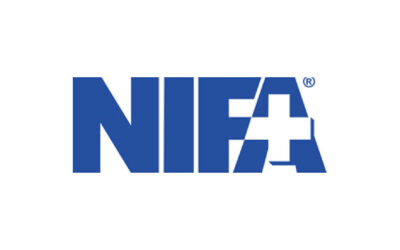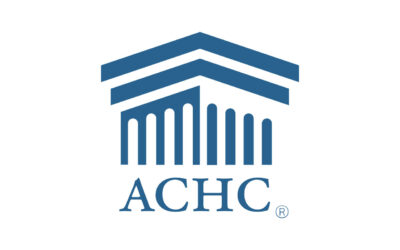by Michael Peabody, MBA
Managing Anxiety
Few things in our industry produce more anxiety than accreditation, the process by which ambulatory surgery centers (ASCs) meet specific administrative and clinical standards and have the quality of their facility validated; and, in many cases, become certified to receive reimbursement from Medicare or other payers. But based on my experience of achieving accreditation for numerous ASCs, it doesn’t have to be an anxiety producing process.
Yes, accreditation is a lot of work. Yes, the cost is not insignificant. Yes, the application process is paperwork-intensive and the day when surveyors tour your facility can be stress inducing.
But I’ve found that ASCs that make a determined effort to adopt best practices and embrace the process are most likely to achieve a successful accreditation. More importantly, at such ASCs the accreditation process serves as a strong platform for clinical excellence and long-term profitability. On the other hand, those who resist or resent the process, or take the view that it’s simply a big regulatory hassle, experience more anxiety and invite a greater likelihood of not attaining their accreditation.
The following 12 steps have been the key to our success in achieving accreditation and building profitable ASC businesses based on clinical excellence and physician leadership.
1. Choose the right agency
There are three primary accrediting agencies – AAAHC, AAAASF and TJC. Each has its particular strengths and specialty, and slightly different compliance standards. ASCs seeking accreditation should look closely at the specific standards for each organization and determine, based on their size and specialty mix, which is the most relevant type of accreditation for them. In my view, AAAHC usually offers the best fit for freestanding surgery centers.
2. Start early and do your homework
Accreditation is an open-book test! In many ways, ASCs have all the answers before they undergo the accreditation survey; but this doesn’t mean you can wait until the last minute to prepare. Each of the three-accreditation organizations mentioned above provides highly detailed handbooks and information on how to meet the standards. This information offers a playbook for success – so by all means take advantage of it. If you know the requirements, you’ll understand the need to start early and work steadily and consistently in the few months between the date your application is accepted and the day the surveyor turns up to inspect your facility. In other words, time is of the essence.
3. Think strategically
The real value of accreditation is that it promotes patient safety and clinical excellence, as well as effective management of the business. I believe the accreditation process underscores many things most ASCs should do anyway if they want to succeed. That’s why surgeons and administrators should reject the notion that accreditation is a “one-time” or “once every few years” event. The standards – from clinical QI to governance to facilities management – should be integral to your everyday processes and procedures. In this way, the accreditation process can help you build a better business for patients, payers and the physicians themselves.
4. Don’t reinvent the wheel
The accrediting agencies provide a wealth of information, including various checklists and forms designed to help you meet the standards. Use them.
Many ASCs hire consultants – and there are many – to help them through the process. Depending on how well your business is organized in the first place, this may be a worthwhile idea. AAAHC has a consulting subsidiary, Healthcare Consultants International (HCI) that provides this type of consulting assistance. I’m one of their consultants, myself. But it operates separately from AAAHC, so using HCI in no way guarantees that your ASC will be “given a pass.”
5. Select a leader, but get everyone involved
In many ways, accreditation is about the people at ASCs, not the facility itself. That – along with the survey team’s comprehensive examination of all areas of operations – is why it’s important to make this a team effort. One person, probably an experienced administrator or clinical director, should lead the effort; but the entire staff must understand what the standards stipulate and why they’re important. In this way, accreditation helps build a culture of excellence. Likely, this will require training and cross training, too. The team approach is vital because, as you must remind your staff, in certain circumstances the surveyors could show up unannounced on a day when the administrator isn’t in the office. (CMS deemed status surveys are unannounced; Non-Medicare surveys are scheduled in advance.) Further, there is a good chance that the survey team will interview staff in addition to administrators or managers. The point is, no one person can handle accreditation alone and surveyors will seek to verify that everybody, including the physicians, are with the program.
6. Conduct a mock survey
This may be the single most important step you can take to prepare. Set aside one day – and better not to tell everyone when it will be – to have a person experienced with the survey process come in and go through the full survey process. This may sound disruptive, but it’s invaluable in getting staff ready.
7. Think like a patient
Because patient care is at the heart of the survey, you should adopt the patient’s perspective as you prepare for the survey. You may want to have a “mystery patient” come through your center and provide a report about his or her experience. Or, as part of a training exercise, do some role-playing so staff can see the facility and operations through the eyes of a patient. Here again, accreditation emphasizes something you should be doing anyway – operating a customer-centric facility and regularly communicating with patients. Remember, it’s possible that the surveyors will interview patients.
8. Cleanliness is next to godliness or, in this case, accreditation
Beyond the need for sterile operating environments, a clean, well-organized and clutter-free facility reflects well on the overall quality of the operation. It shows that the staff cares for and takes pride in the facility – an important intangible in the eyes of surveyors. Cleanliness takes ongoing dedication — you can’t schedule a major cleaning if you don’t know when the surveyor will turn up! The bottom line is that the surveyors will be favorably impressed if the information they request is readily available in clearly labeled and organized file cabinets or in folders on a computer network. It also means surveyors will be able to complete their tasks more easily, which they will certainly appreciate.
9. Embrace automation and technology
Accreditation is largely a matter of keeping documentation and records up to date and complete. There are software tools that can proactively notify you when physicians’ licenses or privileges need to be updated; or maintenance is required for certain equipment or on the building itself. Workflow or practice management software may help ensure that QI committee recommendations are forwarded to the board meetings and all decisions are carefully captured in the minutes. The same holds true for financial management and accounting. Further, you can use email newsletters to track changes to various accreditation standards. The survey team will pore over some or all of these records, so best to automate the potentially overwhelming tasks of keeping them current and organized.
10. Surveyors are not the enemy
Recognize that, however stressful the surveyors’ arrival may make you and your staff; you really are on the same team. In the case of AAAHC, which I am most familiar with, surveyors are dedicated healthcare professionals like your own staff. Consequently, they love to suggest improvements that may lead to higher quality care. It’s appropriate to ask questions and, if necessary, question the surveyor’s findings, though of course you’ll want to do so civilly and professionally. Just as importantly, if you don’t know the answer to a question the surveyor asks, just say “I don’t know” and then go seek the answer. You don’t have to score 100 percent on every standard, and I’ve always found the vast majority of surveyors to be very fair-minded.
11. Smile on survey day
When the big day finally arrives, do your best to relax. Avoid going into fire drill mode. You should make the surveyor or survey team feel as welcome as possible in your facility. Provide a comfortable working space (which of course you’ll have designated well in advance). After an opening conference and introductory facility tour, the surveyor will ask to see specific areas or records. The key for interacting with surveyors is to be professional and personable. Courtesy, warmth and friendliness go a long way and tell surveyors a lot about how you treat patients and their families.
12. It ain’t over when it’s over
Even when the survey is complete and you’ve achieved accreditation, it pays to keep in mind that the process never really ends. Beyond supporting clinical quality and sound financial health of the business, you must stay on top of changes to the accreditation standards and ensure that ongoing procedures for documentation, maintenance and governance function properly. I recommend periodic training and regular clinical, financial and operational audits to keep your ASC in tip-top shape and in a permanent state of compliance with accreditation standards. Annual mock surveys are also a good way to monitor on-going compliance. If you succeed in seeing the link between these standards and management best practices, you’ll no longer view surveys as anxiety-producing events, but rather as a means to keep your ASC performing at the highest level.
The Bottom Line
When people ask me what’s the secret to accreditation, I tell them there are actually three secrets – preparation, preparation, and preparation. The suggestions above really add up to that simple idea. And because in certain types of surveys (Medicare deemed status, for instance), the surveyors can show up at any time, preparation is never complete. Through operational discipline, constant attention to detail and steady focus on the patient, ASCs can use the lessons learned through accreditation as a springboard to long-term clinical excellence and financial success.
About the Author
Michael Peabody is an HCI consultant and has been involved in ambulatory healthcare for over 20 years: as hospital vice president, surgery center administrator, regional vice-president and consultant. Currently, he is certified as a Medicare surveyor for AAAHC and serves both as a survey chairperson and a surveyor mentor. Peabody is also a member of the AAAHC Corporate Alliance Survey team. In his 12 years with AAAHC, he has conducted over 200 surveys including ambulatory surgery centers, office based surgery centers, urgent care centers, dental centers, lithotripsy centers, imaging centers and radiation oncology centers.









